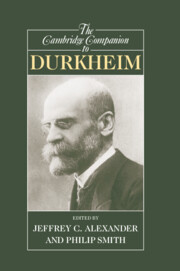Book contents
- Frontmatter
- 1 Introduction: the new Durkheim
- Part I: Life, context, and ideas
- Part II: Symbols, rituals, and bodies
- Part III: Solidarity, difference, and morality
- 12 Durkheim, solidarity, and September 11
- 13 Is Durkheim a class analyst?
- 14 Durkheim’s society revisited
- 15 Beyond solidarity? Durkheim and twenty-first century democracy in a global age
- Further reading
- Index
13 - Is Durkheim a class analyst?
from Part III: - Solidarity, difference, and morality
Published online by Cambridge University Press: 28 April 2008
- Frontmatter
- 1 Introduction: the new Durkheim
- Part I: Life, context, and ideas
- Part II: Symbols, rituals, and bodies
- Part III: Solidarity, difference, and morality
- 12 Durkheim, solidarity, and September 11
- 13 Is Durkheim a class analyst?
- 14 Durkheim’s society revisited
- 15 Beyond solidarity? Durkheim and twenty-first century democracy in a global age
- Further reading
- Index
Summary
The study of social class remains deeply connected to a classical tradition featuring the scholarship of Marx (e.g. [1894] 1964) and Weber (e.g. [1922] 1968). Indeed, when a new class scheme is proposed or an existing one elaborated, a common rhetorical strategy among its proponents is to justify that revision as some truer expression of classical ideas about the structure of inequality. This fascination with the classical tradition is of course realized in a highly selective way, with the scholarship of Marx and Weber typically featured; that of Sorokin, Parsons, and Warner treated as secondary; and that of Durkheim dismissed or ignored. The purpose of our chapter is to show that important insights about contemporary class structure can be gleaned from a fresh rereading of Durkheim's account of occupational associations (see Parkin 1992: 1; Pearce 1989: 1; Müller 1993: 106; cf. Lee 1995; Fenton 1980; Lehmann 1995). We hope to convince even the most jaded skeptics of exegesis that Durkheim is well worth revisiting, that his account is more prescient than typically has been appreciated, and that it can accordingly provide the foundation for a new class analysis that is tailor-made for contemporary research purposes.
The work of Durkheim has not figured prominently in any of the four waves of class analysis that can be identified over the last half-century. The first wave, which emerged in the immediate postwar period, drew on Weber and Sorokin for the purpose of discrediting Marxian class models and advancing gradational interpretations of inequality (e.g. prestige scales). In some variants of this tradition, the rise of a consensual occupational hierarchy was interpreted in functionalist terms (e.g. Parsons 1954), but such functionalist gloss didn't draw on the work of Durkheim save in the most general of ways.
- Type
- Chapter
- Information
- The Cambridge Companion to Durkheim , pp. 322 - 359Publisher: Cambridge University PressPrint publication year: 2005
- 6
- Cited by



